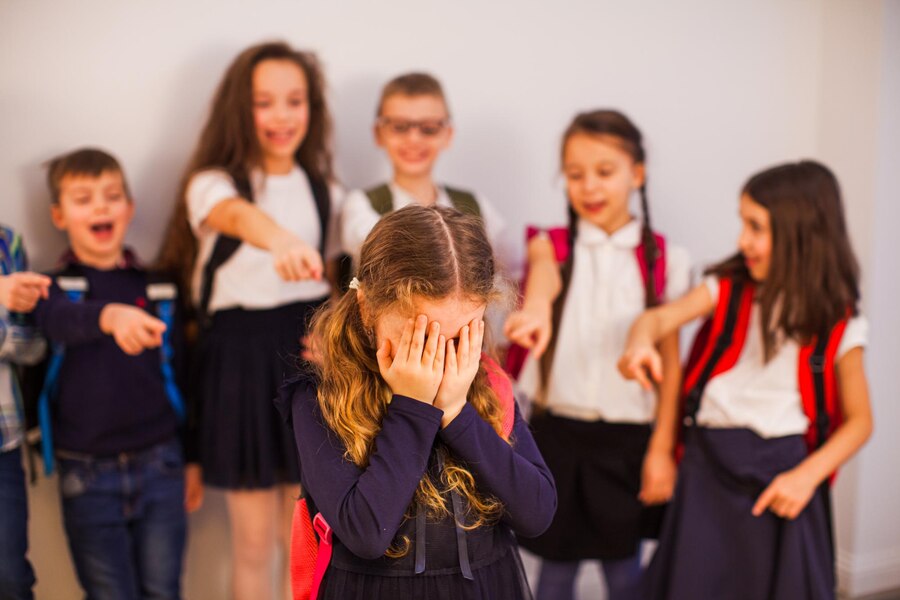What does "point and laugh" mean?
What does "point and laugh" mean? 🤣👉
"Point and laugh" is a phrase that refers to the act of pointing at someone or something and laughing at it / them, often in a mocking or ridiculing manner.
This phrase is often used to describe a situation in which someone or something is being made fun of or laughed at in a mean-spirited way.
In general, "point and laugh" is considered to be a negative behavior that is unkind and disrespectful towards others.
It is usually best to avoid pointing and laughing at others, as it can cause them to feel embarrassed or humiliated.
Instead, it is usually more constructive to engage in more respectful and positive forms of communication and interaction.
Here is an example of how the phrase "point and laugh" could be used in a sentence:
"The group of students couldn't help but point and laugh at the way their classmate tripped and fell while walking down the hallway."



To use the point and laugh, you point your finger or an object towards someone or something and then laugh.
Here is a more detailed answer:
The point and laugh is a way to mock or ridicule someone or something by pointing your finger or an object towards them and then laughing. It is often used as a way to mock or ridicule someone or something that is perceived as funny, ridiculous, or absurd. However, it can also be used in a more aggressive or mean-spirited way to bully or humiliate someone. It is important to be mindful of how you use the point and laugh and to consider the feelings of others.
Here are usage examples to help you better understand this expression better:
"I can't believe he wore that shirt to the party. Let's point and laugh!"
"She tripped and fell in front of everyone. I couldn't help but point and laugh."
"The magician's tricks were so lame. The whole audience was pointing and laughing at him."
Here are a few multiple choice questions to help you practice using this expression:
Which of the following is NOT a reason to use the point and laugh?
A) To mock or ridicule someone or something that is perceived as funny, ridiculous, or absurd
B) To show appreciation or support for someone or something
C) To bully or humiliate someone
D) To express surprise or shock
Answer: B) To show appreciation or support for someone or something
Which of the following is NOT a way to use the point and laugh?
A) Pointing your finger or an object towards someone or something and then laughing
B) Smiling and nodding your head in approval
C) Saying kind words and offering encouragement
D) Rolling your eyes or making a sarcastic comment
Answer: C) Saying kind words and offering encouragement
Which of the following is NOT a potential consequence of using the point and laugh in a mean-spirited way?
A) Causing hurt feelings or embarrassment for the person or thing being pointed at
B) Damage to relationships or friendships
C) Increased popularity or social status
D) Legal consequences
Answer: C) Increased popularity or social status
True or False: It is always okay to use the point and laugh, as long as you find something funny or absurd.
A) True
B) False
Answer: B) False
Conclusion:
The point and laugh can be a fun and lighthearted way to mock or ridicule something that is perceived as funny, ridiculous, or absurd. However, it is important to be mindful of how you use it and to consider the feelings of others. Using the point and laugh in a mean-spirited way can cause hurt feelings, damage relationships, and potentially even have legal consequences. It is important to be mindful of how you use this gesture and to consider the potential consequences of your actions.
We use laughter to show others that we're being playful and non-threatening
Put things into perspective. Most situations are not as bleak as they appear when looked at from a playful and humorous point of view
most people would say " kill them with kindness"
except what is and move on or give a bitter reply...
Should I point and laugh?
Here's the quick answer - NO! Keep reading to find out why...
Why shouldn't I point and laugh at someone?
This is extremely rude and usually only done by children who have not had proper training. This gesture is used to humiliate someone, with the intention of getting others to laugh at them as well.
Why do I see it so much in TV series?
Simply put - because it is TV! What is the context around the point and laugh? Did someone fail or make a mistake? Likely so... The person pointing and laughing is purposefully embarrassing the other individual further.
In conclusion...
Now that you know what this gesture means, don't do it! You would be publicly humiliating the one at whom you are pointing and laughing - Not good!
What's the point of laughter?
Try 3 issues of BBC Science Focus Magazine for £5!
We teamed up with the folks behind BBC World Service's CrowdScience to answer your questions on one topic. You can tune in to CrowdScience every Friday evening on BBC World Service, or catch up online at bbcworldservice.com/crowdscience
Why do we laugh?
Laughter is packed with information. We use laughter to show others that we’re being playful and non-threatening, and this serves to make and maintain social bonds. Much of the time laughter is involuntary and contagious, particularly between friends. The sound of laughter broadcasts loudly and widely, so that other people outside of the laughing group can get information about the relationship of the laughers. In fact, Dr Greg Bryant at University of California, Los Angeles, has found that we’re so adept at interpreting laughter that, in over 20 cultures, people can usually tell from just one second of laughter whether the laughers are friends or strangers.
Which came first, language or laughter?
Most anthropologists think that language originated within the last few hundred thousand years, but it looks like we’ve been laughing for much longer. In 2009, psychologist Dr Marina Davila-Ross at the University of Portsmouth recorded the vocalisations of baby ape species while they were being tickled. By analysing their sounds, she found that great ape laughs share the same structure as human laughs, and that these are most similar in the chimpanzees and bonobos, our closest animal relatives. Her work suggests that laughter arose from a common primate ancestor millions of years ago – long before language evolved.





